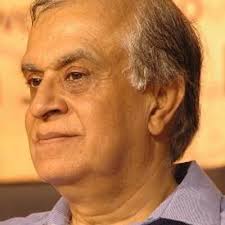Talk by Rajiv Malhotra, hosted at MIT on April 2, Bldg 6-120 @ 2:00 pm
Born in 1950, Rajiv Malhotra is an Indian–American researcher, writer, speaker and public intellectual on current affairs as they relate to civilizations, cross-cultural encounters, religion and science. He studied physics at St. Stephens College in Delhi and went for post-graduate studies in physics and then computer science to the USA. Rajiv served in multiple careers, including: software development executive, Fortune 100 senior corporate executive, strategic consultant, and successful entrepreneur in the information technology and media industries. At the peak of his career when he owned 20 companies in several countries, he took early retirement at age 44 to pursue philanthropy, research and public service. He established Infinity Foundation for this purpose in 1994.
Rajiv has conducted original research in a variety of fields and has influenced many other thinkers in India and the West. He has disrupted the mainstream thought process among academic and non-academic intellectuals alike, by providing fresh provocative positions on Dharma and on India. Some of the focal points of his work are: Interpretation of Dharma for the current times; comparative religion, globalization, and India’s contributions to the world.
He has authored hundreds of articles, provided strategic guidance to numerous organizations and has over 300 video lectures available online. To best understand Rajiv’s thoughts and contributions, his books are a good resource. Besides “Invading the Sacredâ€, in which Rajiv is the main protagonist, he has authored the following game changing books:
The Battle For Sanskrit: “Is Sanskrit political or sacred, oppressive or liberating, dead or alive?â€
Being Different: An Indian Challenge to Western Universalism
Breaking India: Western Interventions in Dravidian and Dalit Faultlines; and
Indra’s Net: Defending Hinduism’s Philosophical Unity
Currently, Rajiv Malhotra is the full-time founder-director of Infinity Foundation in Princeton, NJ. He also serves as Chairman of the Board of Governors of the Center for Indic Studies at the University of Massachusetts, Dartmouth, and is adviser to various organizations.
Infinity Foundation has given more than 400 grants for research, education and community work. It has provided strategic grants to major universities in support of pioneering programs including: visiting professorships in Indic studies at Harvard University, Yoga and Hindi classes at Rutgers University, research and teaching of nondualistic philosophies at University of Hawaii, Global Renaissance Institute and a Center for Buddhist studies at Columbia University, a program in religion and science at University of California, endowment for the Center for Advanced Study of India at University of Pennsylvania, lectures at the Center for Consciousness Studies at University of Arizona.
What motivated a successful entrepreneur like you to take a deep interest in Indology?
I did not start out being an Indologist. I left being an entrepreneur when I had a spiritual transformation at the age of 44. I decided to give up making money and engage in spiritual pursuits. I started to study to enhance my own spirituality and for Swadharma – to give back to society. As I scratched the surface and engaged people, debated them, I realized there is a huge amount of bias. Our leaders are in denial. They did want to understand it. Many were ignorant. Many wanted the good things that leadership offers, not the controversies for it is too big a price to pay. So I got drawn to taking on things myself. Being logical by training, articulate, confident I decided to take them. That is how I got into Indology. It is a thankless job. All people want to do the fun things, which are rewarding where you are a celebrated hero. I could have done a lot of that with het kind of money I was throwing at it. But I wanted to do something that is important and that which no one else will do. It is risky and difficult which is why no one does it. There are too many challenges to do this sort of thing. That is how I got into this.
How did you gather the knowledge that led you question the highly reputed academicians in the field of Indology?
My knowledge comes from three things
1. My own meditation, practice, my Sadhana, guidance from Guru, Adhayatmic inner process which gives me inspiration, which gives me insights
2. Very analytical hardworking nature to study things. I have read over 2000 books – very complex not pop-culture kind, academic type. I have attended conferences. I am a studious kind.
3. Constantly confronting, engaging, debating people outside. I have done about 100 encounters per year over 20 – 25 years. I have learned a lot from these encounters.
A smart Indian can learn anything. Indology is not that hard. If we can be doctors and engineers Indology should be easy to learn. It is not rocket science. The highly reputed academicians you refer to are not very smart. They are emotional, disturbed and biased. They are not logical. They rely on their reputation and power games. It is unfortunate. Once you challenge them you see that they are not formidable.
Why did you decide to become a crusader and take on this very challenging task of questioning the academicians?
Nobody else was doing it. I wanted to something that is a games changer. It is something that is important to do, risky to do and difficult to do. It is a thankless job. When you do something easy and safe you are just one among the crowd. It is not very challenging
Do you feel confident that Sanskrit can indeed be "taken back"?
Sankrit and Sankriti are both interlinked. Sanskrit is a part of Sanskriti and when I say taking back Sanskrit, I mean taking back Sanskriti.
We have to fight for Sanskriti otherwise we will become like the many civilizations that have been lost. We have to fight for it. Otherwise we will become second grade pseudo-white, craving to be white where really we don’t belong. It is a mental slavery. I do not see any choice to keep fighting the best we can.We may not be able to have all of it. I hope we can preserve enough.
I feel confident that we can do it. We have money, confidence that comes with it and large numbers of people. The Chinese have done it. The Arabs have done it. So why can’t we?
Given the "referral" nature of publications where credibility comes from quoting other sources that are considered credible in the academic world, how can those who oppose those works hope to gain credibility?
It is a circular system. It is self-perpetuating system. There is a cartel of scholars who peer-review each other and give jobs to each other’s students. They endorse each other. It is a club. It is very difficult to break into that.
However that is true of any old boy’s network. Any old school technology must be disrupted. Who could have imagined the retail industry to be disrupted by Amazon.
There are breakthroughs and innovation. It is time to break these cartels and create our own eco-system, our own distribution network , our own Adhikars and our own brands. All this requires hard work. I alone cannot do it. I can take the lead. I am waiting for others to join me. That is the hard part to get other Indians, other Hindus motivated to do this together. Once we have a critical mass of solidly committed people we could win
What message do you hope that people of Indian origin will take away from the book?
People of Indian origin should know that our civilization is not in good hands with the western Indologists representing it and misrepresenting it , doing the dog and pony show and in a sense making a fool of us. They know how to impress us and say all the right things and make us happy. All these Indian leaders who are not so bright and hardworking, they get in awe, they get really impressed. It really is a sham. The colonialists did it and now the America Indologists are doing it. There are many great things about America. It is a great country. By the way the average American is not doing this. Indologists are not average Americans. They are specific types of people who get power and a kick out of dominating us, showing that they know more about our culture than we do. They have a superiority complex. Average Americans are not that way. I want to educate the Indians that the people who control our discourse are not the average American but a specific kind of person with all kind so of ego problems.
Have you received reaction to your book from Sheldon Pollack and other Indologists?
Sheldon Pollack is angry rather than engaging. They have never come to any of our meetings. They are upset that more and more people are reading my work, inviting me and quoting me. I expect more and more attacks. They will get someone to write a slanderous review and blame me personally. I am not bothered by it.
You mentioned in an interview that you met the Shankaracharyas. What was their reaction to your mission?
Shankaracharya of Kanchi was extremely supportive of my work. He has distributed a hundred copies of my work to leading scholars. We had great discussions which were off-camera that I am not at liberty to share.
Any message for our readers?
I urge everyone to buy my book . Join my group discussions. Take excerpts and quote them. Tweet it or share on facebook
I look forward to coming to MIT to meet the Boston community.



